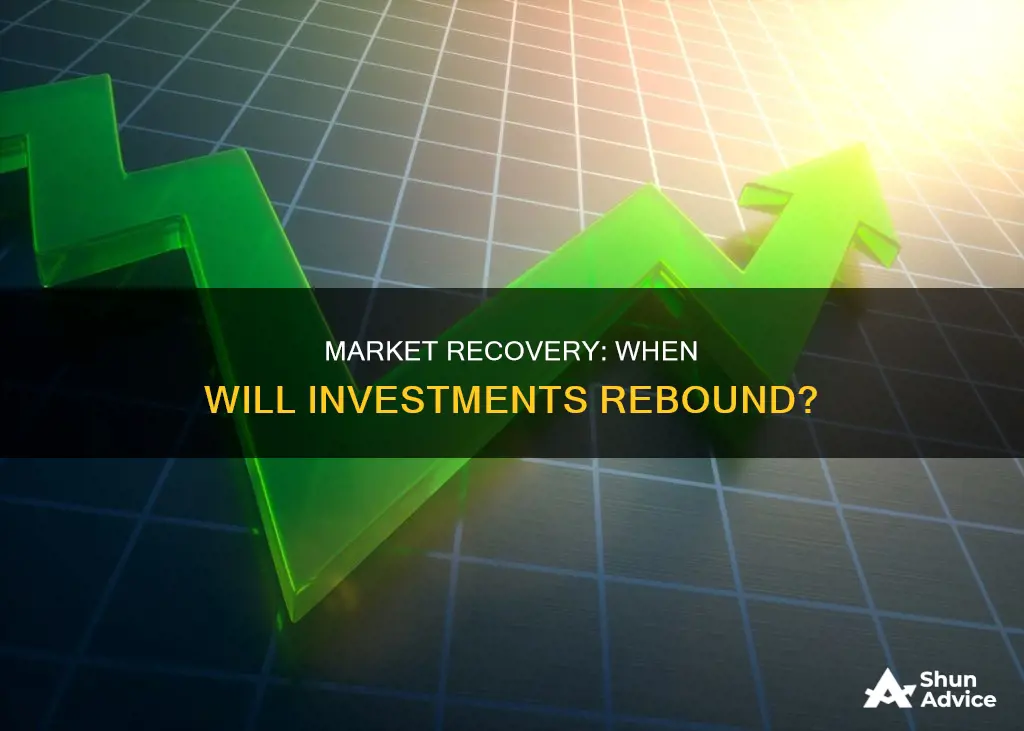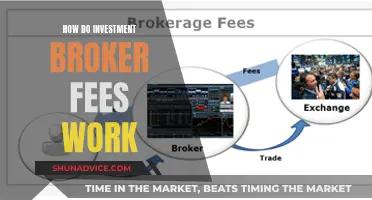
The stock market has been turbulent in recent years, with the S&P 500 experiencing its worst first-half performance since 1970 in 2022. While there is no guarantee of when the market will recover, some experts predict a potential turnaround in 2023 or 2024, with the Federal Reserve's interest rate hikes expected to stabilise the economy and lead to a market recovery. The performance of the stock market depends on the financial outlook of companies across the economy, which is currently affected by various economic threats such as inflation, interest rate hikes, and the potential for recession.
| Characteristics | Values |
|---|---|
| Stock market crash predictability | Stock market crashes are only clearly identifiable in hindsight. |
| Stock market crash definition | A sharp and sudden drop in stock prices, usually following an uptrend in the stock market. |
| Stock market crash preparation | Diversify your portfolio, focus on the long term, and consider taking advantage of market downturns. |
| Stock market recovery predictability | There are no guarantees when it comes to the stock market. |
| Stock market recovery timing | It usually takes between 12 and 18 months for Fed rate hikes to lead to economic stability and market recovery. |
| Stock market recovery signs | Strong first-quarter earnings numbers, lower inflation, earnings growth acceleration, and interest rate cuts. |
What You'll Learn

The impact of interest rate changes on investments
Interest rates and investments have a complex relationship, and changes in interest rates can impact different types of investments in various ways. Here is an overview of how interest rate changes can affect investments:
Impact on Bonds
Bonds and interest rates typically share an inverse relationship. When interest rates increase, bond prices tend to fall, and when interest rates decrease, bond prices often rise. This is because newly issued bonds will offer higher coupons after a rate increase, making previously issued bonds with lower coupons less valuable. The sensitivity of a bond's price to interest rate changes is known as its "duration," and longer-maturity bonds tend to be more sensitive to these changes.
Impact on Stocks
Changes in interest rates do not directly affect the stock market. However, they can have indirect effects on stock prices. When interest rates rise, banks usually increase their lending rates for consumers and businesses, leading to reduced spending and potentially hindering company expansions and hires. These factors can contribute to a decrease in stock values. Conversely, lower interest rates encourage consumer spending and business investments, which can boost stock prices.
Impact on Other Investments
Interest rate changes can also impact other types of investments, such as savings accounts, certificates of deposit (CDs), commodities, and real estate. Higher interest rates may lead to higher annual percentage yields (APYs) on savings accounts and CDs, making them more attractive. On the other hand, commodity prices may fall when interest rates rise, making them less favourable for investors. Real estate prices are also sensitive to interest rate changes, as they are closely linked to financing costs and exhibit some bond-like characteristics.
Investor Strategies
When interest rates fluctuate, investors may consider various strategies to mitigate risks and optimise their portfolios. Diversification is crucial, as it helps spread risk across different asset classes. Additionally, focusing on long-term goals and maintaining a balanced portfolio of stocks and bonds can help weather short-term fluctuations. For income-oriented investors, changes in interest rates may impact their ability to generate returns from interest, leading them to adjust their investment strategies accordingly.
Investment Bankers: Why All the Hate?
You may want to see also

The role of the Federal Reserve in the stock market
The Federal Reserve System, often shortened to the Federal Reserve or the Fed, is the central bank of the United States. It was created in 1913 to provide the country with a safe, flexible, and stable monetary and financial system. The Fed has a board of seven members and 12 Federal Reserve banks, each operating as a separate district with their own presidents. The Fed's main duties include conducting national monetary policy, supervising and regulating banks, maintaining financial stability, and providing banking services.
The Federal Reserve System has four main components: the board of governors, the Federal Open Market Committee, the 12 regional Federal Reserve Banks, and the member banks throughout the country. The Federal Open Market Committee (FOMC) is the Federal Reserve's main monetary policymaking body and is responsible for open market operations. The FOMC includes the Board of Governors and the presidents of the Federal Reserve Banks.
The Federal Reserve System plays a crucial role in the stock market through its monetary policy decisions and tools. These decisions and tools can influence interest rates, the money supply, and economic activity, which in turn can impact stock market performance. For example, the Fed can adjust the federal funds rate, which is the rate of interbank lending of reserve balances. By influencing this rate, the Fed can affect overall financial conditions and economic activity, including household and firm demand for goods and services, employment, and inflation.
Additionally, the Fed has the ability to implement quantitative easing policies, where it purchases corporate bonds and mortgage-backed securities from banks and other financial institutions, injecting money into the financial system. This can also have a significant impact on the stock market by increasing the money supply and stimulating economic activity.
In summary, the Federal Reserve System, through its monetary policy decisions and tools, plays a crucial role in the stock market. Its actions can influence interest rates, the money supply, and economic activity, which can have a direct or indirect impact on stock market performance.
What Your Peers are Investing In
You may want to see also

How to prepare for a stock market crash
A stock market crash is marked by a sharp and sudden drop in stock prices, usually following an uptrend in the stock market (also known as a bull market). While there's no specific number that indicates a crash, if the S&P 500 drops 7% in a single day, this marks a very bad day on Wall Street.
- Know what you own and why you own it: A fear-driven reaction to a temporary slump is not a good reason to dump an investment. Thorough stock research includes a written record of the strengths, weaknesses, and purpose of every investment in your portfolio. During a market downturn, this document can prevent you from making impulsive decisions.
- Diversify your portfolio: Diversification is key to reducing investment risk and smoothing the ride through a tumultuous market. If you've invested across different asset classes, such as stocks and bonds, your results may vary, and you can offset potential losses in one area with gains in another.
- Consider buying the dip: Market dips can be an opportunity to buy stocks at a lower price. If you have an emergency fund, money allocated for retirement, and cash available for everyday expenses, you may be ready to buy the dip. However, don't be surprised if you freeze in place during the moment of opportunity—this is a common reaction.
- Get a second opinion: Consider hiring a financial advisor to provide an independent perspective on your portfolio and financial plan. This can help you avoid self-doubt and ill-advised tactics during tough times.
- Focus on the long term: It's important to remember that when you sell investments in a downturn, you lock in your losses. If you have a long investment timeline, it's often best to ride out the downturns. Historically, the market has always recovered, and doing nothing is often the best course.
- Take advantage of Roth conversions: Financial planners often suggest using market declines as an opportunity to convert traditional IRA assets into a Roth IRA. Once the market recovers, you can watch those migrated assets grow tax-free.
- Don't try to predict the market: There's no reliable way to predict a market crash, and it's generally more productive to build a resilient portfolio that can withstand crashes rather than trying to predict or profit from them. Be skeptical of self-styled experts or economists who claim to predict an imminent market crash, especially if they are selling something.
Ultimately, if you own a diversified portfolio and focus on the long term, you're already doing almost everything you can to prepare for a stock market crash.
Magic: The Gathering — A Collectible Investment
You may want to see also

The relationship between inflation and investments
Inflation and investments are closely related. Inflation is a rise in the average cost of goods and services over time, and it can affect all areas of the economy. While it might seem like a small factor, inflation can chip away at your investments and erode your purchasing power. Here's how inflation impacts different types of investments:
Effect of Inflation on Savings
Inflation can reduce the value of your savings over time, even if you have secured your funds in a savings account with an average interest rate. For example, if you need $45,000 per year to sustain your current lifestyle, you would need approximately $109,000 in 30 years to maintain the same purchasing power, assuming a 3% annual inflation rate. Therefore, it's crucial to monitor your savings against inflation to ensure you have enough assets to last through your retirement years.
Effect of Inflation on Fixed-Income Investments
Inflation can significantly impact fixed-income investments such as corporate or municipal bonds, treasuries, and certificates of deposit (CDs). These investments offer a stable income stream through interest payments. However, since the income stream typically remains constant until maturity, the purchasing power of the interest payments declines as inflation rises. As a result, the real returns on these investments are lower than the nominal interest rate, and investors may experience a loss in purchasing power.
Effect of Inflation on Stocks
In theory, a company's revenues and earnings should increase at a similar pace as inflation, leading to a rise in stock prices. However, during periods of high inflation, stock prices tend to be volatile. This is because stock prices are based on investor expectations of future earnings, and extreme inflation can make these expectations uncertain. Additionally, companies with high debt levels may struggle due to increased borrowing costs, impacting their profitability.
Effect of Inflation on Real Assets
Real assets, such as commodities and real estate, often have a positive relationship with inflation. Commodities, particularly energy-related commodities like oil, tend to rise with inflation. Industrial and precious metals also usually increase during inflationary periods. Real estate owners may increase rent payments in line with the Consumer Price Index (CPI), which can lead to higher profits and investor distributions.
Strategies to Defend Your Portfolio Against Inflation
To protect your investments against inflation, consider diversifying your portfolio by including US stocks and real assets. Additionally, Treasury Inflation-Protected Securities (TIPS) offered by the US government can provide a more reliable performance as their returns are adjusted according to the CPI. While TIPS returns tend to be relatively low, they can help shield your portfolio from the negative effects of inflation.
Networking: Your Secret Weapon for Success
You may want to see also

The effect of economic conditions on investments
Investments and economic conditions are closely linked, with economic conditions having a significant impact on investment decisions and outcomes. Here are some key ways in which economic conditions can affect investments:
Interest Rates
Interest rates play a crucial role in investment decisions. Higher interest rates make borrowing more expensive for businesses, increasing the cost of investment projects. Additionally, high-interest rates offer a better rate of return on savings, making investment opportunities less attractive in comparison. The marginal efficiency of capital states that an investment must provide a higher rate of return than the interest rate to be worthwhile. As a result, when interest rates rise, fewer investment projects are undertaken. On the other hand, lower interest rates can stimulate investment by making borrowing cheaper and reducing the opportunity cost of investing.
Economic Growth and Demand
Economic growth and changes in demand influence investment decisions. Firms typically invest to meet future demand. Therefore, if demand is falling, businesses will cut back on investment, while an increase in demand will encourage more investment. The accelerator theory highlights the relationship between economic growth and investment, suggesting that investment depends on the rate of change in economic growth. A positive shift in economic growth will lead to increased investment spending, while a downturn will cause investment to fall.
Business Confidence and Expectations
Confidence and expectations about future economic conditions also affect investment. Businesses are more likely to invest when they are confident about future costs, demand, and economic prospects. Conversely, during times of uncertainty, such as political turmoil or economic downturns, firms may postpone investment decisions until there is more clarity.
Technological Developments
Technological advancements can influence investment decisions by impacting the productivity of capital. For example, the introduction of new technologies may encourage firms to invest to take advantage of increased efficiency. On the other hand, a slowdown in technological progress may lead to reduced investment as firms anticipate lower returns.
Availability of Finance
The availability of finance from banks and other sources can also impact investment. During economic downturns, such as the credit crunch of 2008, banks may be reluctant to lend, hindering investment even when interest rates are low. The level of savings in the economy is another factor, as higher savings enable more resources to be channelled into investment.
Government Policies and Regulations
Government policies and regulations can either encourage or discourage investment. For example, tax breaks and subsidies can make investment more attractive, while strict planning legislation may deter investment. Additionally, public sector investment in infrastructure, schools, hospitals, and transport can also impact the overall investment landscape.
Gov't Spending: Young vs. Old
You may want to see also
Frequently asked questions
There's no reliable way to predict if and when a market crash will occur. It's generally recommended to build a resilient portfolio that can withstand market crashes instead of trying to predict them.
Not every prediction is wrong, but a lot of them are. It's good to be sceptical of influencers, self-styled experts, or even well-credentialed economists who preach about an imminent market crash.
While there is no solid answer, some experts predict a potential recovery in 2024. The S&P 500 is expected to climb an estimated 8% in early 2024, but future forecasts are often inaccurate.
The stock market bounced back somewhat in the first few months of 2023, but it was not enough to repair the damage from the previous year.
On average, bear markets last 289 days. It usually takes between 12 and 18 months for Fed rate hikes to lead to economic stability and a potential market recovery.







